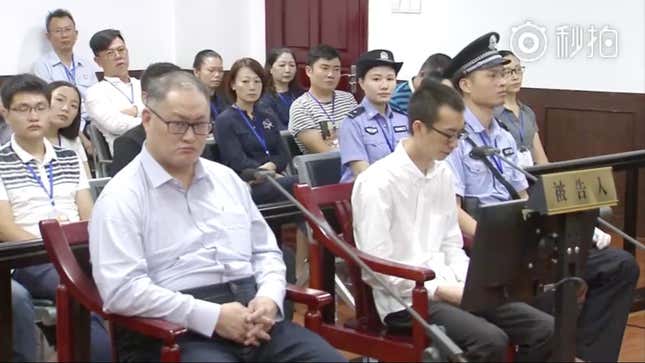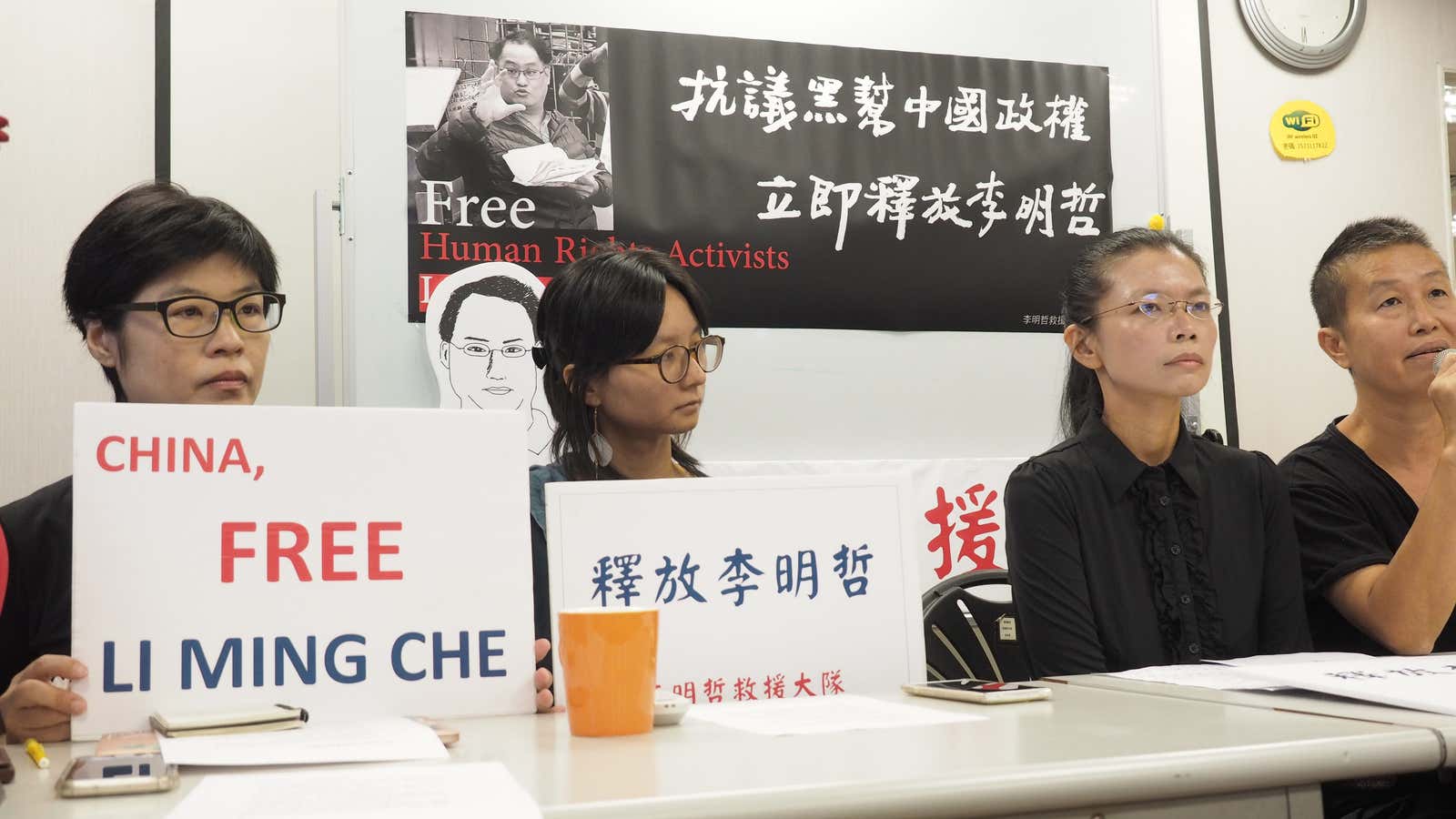In the end, the trial of Taiwanese human rights activist Lee Ming-che, who was “disappeared” in China in March, surprised no one.
After over 170 days in detention, 42-year-old Lee went on trial in Hunan province today (Sept. 11). He not only pleaded guilty to charges of subverting state power by promoting Western-style democracy in online messaging groups, but said that he had been misled by false portrayals of China in Taiwanese media and saw how “civilized” China (link in Chinese) was while he was detained. He also said he would work to facilitate unification between Taiwan and China if he goes back to Taiwan.
His wife Lee Ching-yu had asked the Taiwanese people to forgive her husband (link in Chinese) if he said or did anything embarrassing in court, because he only did so under duress.

Patrick Poon, a researcher at Amnesty International, called Lee’s trial—which was broadcast (link in Chinese) over social networking site Weibo—a “typical sham trial in China.” He has had no access to his family since his detention, and his lawyer was appointed by the Chinese court, said Poon. Lee’s family was only notified last week of the trial’s date, and his wife and mother only arrived in China yesterday (Sept. 10).
Lee’s arrest and trial come during a particularly repressive period for Chinese civil society. This year, China enacted a tough new law against foreign non-profit organizations, subjecting them to extra scrutiny if they want to continue operating in China. And as the date of an important Communist Party meeting in October approaches, Beijing is tightening its noose further around internet use, including cracking down on the use of VPNs and anonymity on the internet. Last week it unveiled new rules governing what users say in online chat groups, with the threat of downgrading people’s social-credit scores if they express politically undesirable views. A number of lawyers and activists have also been forced to give “confessions” on television in China in the past year, including Hong Kong booksellers who were abducted to China.
Lee’s identity as a Taiwanese advocate of democracy and human rights may have put him in a particularly vulnerable position; he is the only Taiwanese person ever to be charged with the crime of subverting state power in China. Both Lee and his wife have for years worked for organizations that promote human rights, especially through the lens of Taiwan’s own transition from martial law to a democracy. Lee Ching-yu said that for five years her husband, who has been employed full time as an administrator at a community college in Taiwan, had been traveling to China to participate in discussions relating to these issues; she herself has been working for the Shih Ming-Te Foundation for 15 years, which was founded by a former political prisoner in Taiwan.
Jerome Cohen and Yu-Jie Chen, experts in Chinese law at New York University and Columbia University, respectively, wrote in April that Lee Ming-che’s past affiliation with the current ruling party of Taiwan, the Democratic Progressive Party (DPP), may have been particularly problematic in Beijing’s eyes. The DPP, which came to power when Tsai Ing-wen won the presidential election in 2016, advocates Taiwanese independence, while Beijing claims Taiwan as its own territory—since Tsai came to power, relations between Taipei and Beijing have chilled considerably. Cohen and Chen point out that in Lee’s case, Beijing is conspicuously ignoring a Judicial Mutual Assistance Agreement signed in 2009, which, among other things, stipulates that family members should be allowed to visit anyone who has been detained by authorities on the other side. The Taiwanese government said that other nationals being held in China have had their rights curtailed despite the agreement.
In comments made to the press following Lee’s trial, a spokesman for the Taiwanese government said (link in Chinese) that it would do “everything in its power to help Lee return home,” but added it had no comment specifically regarding the charge of subverting state power.
In a statement, an umbrella group of activists and NGOs calling for Lee’s release said (link in Chinese): “We appeal to the Taiwan government to make a strong statement on the issue of criminal jurisdiction between the two countries, so as to prevent all Taiwanese nationals from falling into China’s jurisdiction.”
While Lee Ching-yu—who often appears stoic and clear-headed in public appearances—awaits her husband’s verdict, she’ll undoubtedly continue her one-woman campaign to raise awareness of her husband’s case. She already attempted to find her husband by going directly to China in April, but was denied boarding a flight from Taipei to Beijing. In an interview (link in Chinese) with Taiwanese media, she said that she believes in the power of international pressure, citing the role international organizations and media played in exposing the atrocities of Taiwan’s military government.
Whether by sheer coincidence or cynical orchestration on Beijing’s behalf, Lee’s trial coincides with the start of a meeting in Geneva of a United Nations Working Group on Enforced or Involuntary Disappearances. Lee’s disappearance is one of the cases that will be discussed at the meeting.
